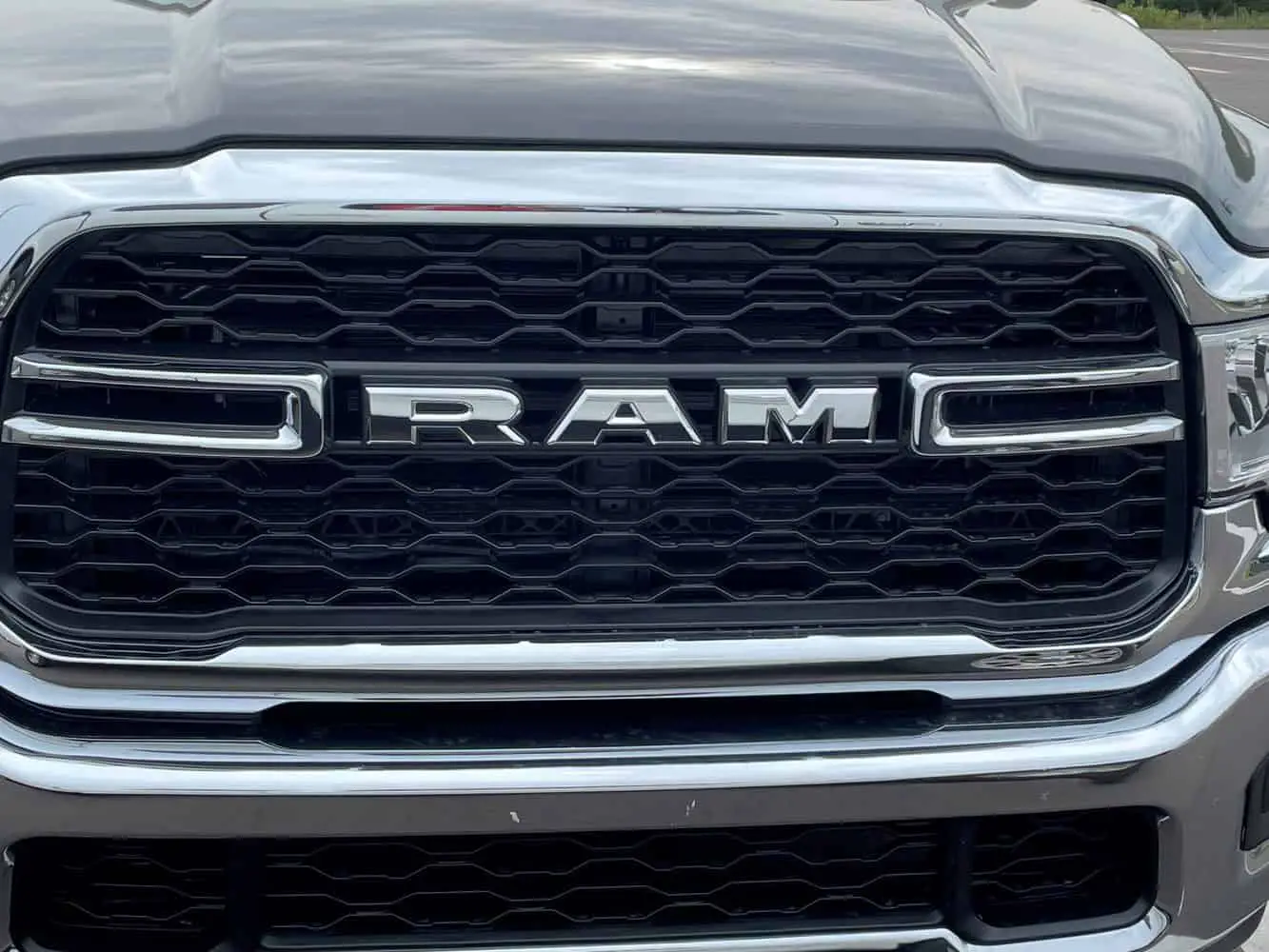The Ram 1500 can comfortably tow between 6,760 and 11,650 pounds—perhaps more if you invest in a specialized towing package.
As you probably know, not all trucks are up to the task. We’re here to clue you in on whether this particular model is suited to hauling–and if so, what size trailer it can handle.
In addition to pointing out the towing capacities of the various Dodge Ram 1500 models, we’ll cover the following points:
- How do the manufacturers determine a truck’s towing capacity?
- What is payload capacity, and what effect does it have on the towing capabilities?
- Is it possible to use a Ram 1500 to tow a fifth wheel camper?
- How do the different engine styles affect the towing process?
- Does the Ram 1500 need 4-wheel drive in order to tow a camper?
The Dodge Ram 1500: A Breakdown
Before we begin, let’s take a look at the various trim levels that Dodge offers for this model.
As you can see, the engine type has a modest effect on the towing capabilities. In the interest of being thorough, we’ve included some relevant information in the chart below.
| Trim | Engine | Max Towing Capacity | Max Payload |
| Tradesman HFE | 3.6-Liter V6 24V VVT eTorque Upgrade | 6,760 lbs | 1,240 lbs |
| Big Horn | 3.6-Liter V6 24V VVT eTorque Upgrade | 7,740 lbs | 2,010 lbs |
| Big Horn | 3.0L V6 Turbo Diesel Gen 3 | 10,040 lbs | 1,810 lbs |
| Big Horn | 5.7-Liter V8 HEMI MDS VVT | 11,650 lbs | 1,930 lbs |
| Big Horn | 5.7-Liter V8 HEMI MDS VVT eTorque | 11,560 lbs | 1,850 lbs |
| Lone Star | 3.6-Liter V6 24V VVT eTorque Upgrade | 7,740 lbs | 2,010 lbs |
| Lone Star | 3.0L V6 Turbo Diesel Gen 3 | 10,040 lbs | 1,810 lbs |
| Lone Star | 5.7-Liter V8 HEMI MDS VVT | 11,650 lbs | 1,930 lbs |
| Lone Star | 5.7-Liter V8 HEMI MDS VVT eTorque | 11,560 lbs | 1,850 lbs |
What Size Truck Do You Need To Pull A Travel Trailer?
You’ll want at least a half-ton truck if you’re hoping to pull a camper that weighs over 6,500 pounds. Depending on the model, these trucks may be able to tow up to 10,000 pounds.
The Ram 1500 is an example of a half-ton truck. That means it should be able to pull your medium-sized camper trailer without hardship. If you opt for a powerful engine (see separate section below), you may even be able to exceed the 10,000 pound limit.
For larger campers, go for a 3/4-ton to a full-ton truck. These will give you more leeway when packing and reduce the risk of overload.
How Do The Manufacturers Determine Tow Capacity?
The tow capacity of a truck is the maximum amount of weight that it can safely pull. Exceeding this capacity can cause damage to the engine and transmission of the vehicle—and even the tires and frame.
So where do the manufacturers get these numbers? Interestingly enough, market research is responsible for some of the data. The engineers contact actual customers to find out what they’d like to haul, and research their competitors for current trends. The goal is to match what the customers would like to see, and exceed the towing capacity of comparable models.
Similarly, the ratings come in handy when it’s time to upgrade the models for the new year. If consumers are satisfied with the older models, the manufacturers won’t bother to make any changes. Conversely, if the ratings indicate that the current tow capacity is unsatisfactory, they’ll boost the weight and the cooling drag of the vehicle to give it more towing power.
The next step is capability testing. The engineers need to make sure the truck has enough torque to get the load moving, even if it has to start from a complete stop when parked on an uphill slope. The cooling capabilities need to be efficient enough to avoid overheating in hot weather, and the brake capacity must be capable of withstanding the heavier load.
These tests are rigorous, beginning at the laboratory level before moving on to the practical sessions. The trucks are put through their paces in all manners of weather, from extreme heat to heavy humidity to bitter cold. When they’re finished, the manufacturers are confident that the vehicle will be able to handle the amount of weight that’s listed in the user manual.
Important Terms To Remember
The following factors all come into play when engineers are determining the tow capacity of a truck or SUV. It’s a good idea to familiarize yourself with them so you can understand how each one relates to the process.
Horsepower
Put simply, horsepower is the force that moves the vehicle forward. A higher HP level means more power. The 2022 Dodge Ram HP levels for the 1500 models range from 260 to 702, depending on type.
Torque
The torque specs refer to the energy required to spin the wheels themselves. This is essential when the vehicle is starting from a standstill, but once it’s in motion, the truck doesn’t have to rely on this energy anymore.
For more information on how torque relates to towing, see How Does The Engine Style Affect The Towing Process?, below.
Axle Ratio
Vehicles with higher axle ratios can handle heavier loads than those with low axle ratios. On the other hand, a lower ratio is better for fuel conservation, especially if you have a light load to begin with. Here’s why.
The axle is responsible for determining how many revolutions the tires will make based on the energy available. Slow-spinning wheels deliver more power while burning up more energy, while faster spinning expends less energy but isn’t as effective when it comes to towing a great deal of weight.
What Is Payload Capacity?
Payload is a term used to describe the weight capacity and suspension of the truck box. It refers to the amount of weight that the truck can hold in the cab or cargo bed. The tongue weight, or degree of pressure that the towing hitch puts on the vehicle, helps the manufacturers calculate this number.
Tongue weight is determined by the overall weight of the travel trailer, as well as weight distribution. It’s a bad idea for most of the weight to be supported by the hitch, as it may cause it to break in half. That’s why it’s a good idea to steer clear of higher tongue weights.
Proper weight distribution can also help reduce the amount of sway that occurs during driving. This is true especially if the travel trailer is especially light or carries most of its weight in the rear.
For optimum results, aim for a tongue weight that’s somewhere around 10 percent of the loaded trailer weight.
Can a Dodge Ram 1500 Tow A Fifth Wheel Camper?
Although this model is equipped to handle moderately heavy loads, it doesn’t have the separate towing capacity that’s required for fifth wheel trailers. The truck bed is often too short, meaning you would have to purchase a stationary hitch and a Sidewinder pin box for the camper.
Since fifth wheel campers are generally quite large, it’s better to choose a 3/4-ton truck to ensure safer towing. If you’re hoping to stay with the same make, the Dodge Ram 2500 might be a good option.
That doesn’t mean it’s impossible to tow a fifth wheel with the 1500, but you’ll have to read the specs carefully. It’s best if the fifth wheel is on the smaller and lighter end of the spectrum, just to make sure it doesn’t exceed the truck’s capabilities.
How Does The Engine Style Affect The Towing Process?
As you can see from the table above, a truck with a 5.7-Liter V8 HEMI engine can tow roughly 1,000 pounds more than the same model with a lesser engine. In general, higher torque specs and/or horsepower ratings result in the engine being able to handle heavier loads.
A high torque is critical to effective towing because it allows the truck to perform tasks without expending too much energy. If an engine has high horsepower but a lesser torque, it will have to work harder in order to tow the same load as one with a higher torque. It may still be able to do it, but if you compare the two performances side by side, you’ll be able to see which is more effective.
Since diesel engines have more torque than those that run on regular gasoline, they can usually haul more weight. As a bonus, diesel gets better fuel mileage. Therefore, you’ll have better luck if you restrict your search to include Dodge Ram models that include diesel engines.
Does The Truck Need 4-Wheel Drive To Pull A Camper Trailer?
The only times 4-wheel drive comes in handy during towing are during inclement weather, or when the road is especially muddy. Since the same principles apply whether you’re towing a camper trailer or not, I wouldn’t say that 4-wheel drive is necessary.
In fact, it’s a bad idea to pull a travel trailer on dry pavement with the truck set to 4-wheel drive. You want the power to come from the rear of the vehicle, as the rear axle will be bearing the brunt of the weight. If you’re in 4-wheel drive, the power will be distributed between the front and rear axles.
If you plan to take your camper out in winter, or if you frequently drive along dirt roads, then the 4-wheel drive might come in handy. For normal towing conditions, however, 2-wheel drive is sufficient.
In Conclusion
There are a number of excellent travel trailers that weigh under 10,000 pounds, so if you already own a Dodge Ram and are looking for a camper, you should be able to find one that suits your needs. On the other hand, if you need a towing vehicle that can handle your current camper, one of these models just might have you covered.
Good luck in your travels, and happy camping!
Check out our article on: What Size Travel Trailer Can A F150 Pull?

